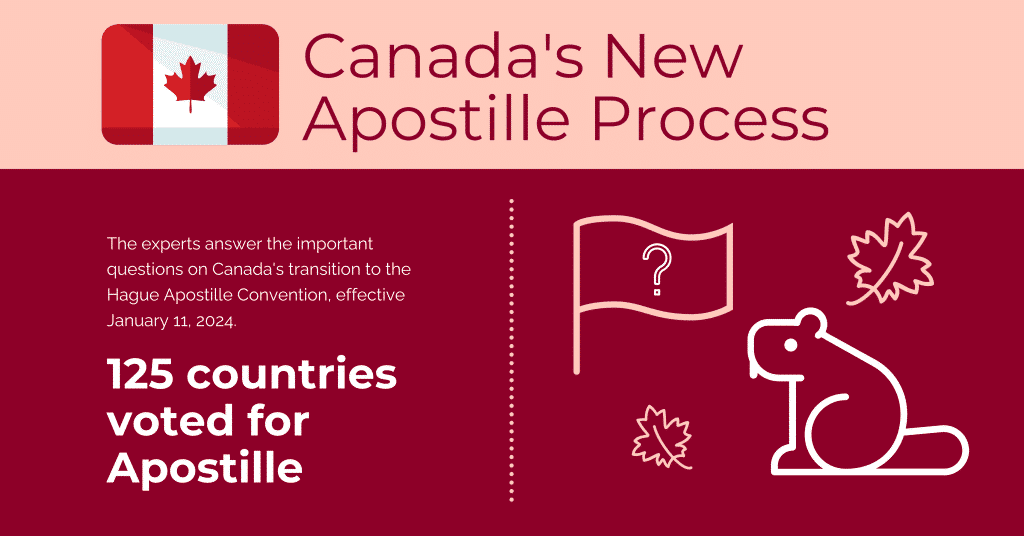
Understanding the Apostille Process: Canada Joins the Hague Apostille Convention
Introduction to Apostille
The term “Apostille” might sound quite foreign to many, but its implications are vast, especially in international documentation processes. An apostille is essentially a certification attached to documents to verify their authenticity for use in foreign countries that are members of the Hague Convention.
Canada’s Accession to the Hague Apostille Convention
Canada, stepping into a new era of international documentation, has recently acceded to the Hague Apostille Convention, thus, adopting a simpler and more efficient way to authenticate documents for international usage. This development comes as significant news for Canadians involved in international affairs, legal processes, and business transactions.
The Mechanics of the Apostille Process
Definition and Purpose of Apostille
An apostille authenticates the origin of a public document, thereby making it recognized and acceptable in foreign countries that are part of the convention. It primarily serves to abolish the requirement for diplomatic or consular legalization of foreign public documents, facilitating smoother international interactions.
Process and Requirements
The apostille process involves attaching a certificate to the document, certifying the signature and the position of the person or authority that has issued or notarized the document. This process requires a thorough check of the document’s origin and the signer’s authority, ensuring the document’s credibility and acceptance internationally.
Benefits of Obtaining an Apostille
Obtaining an apostille for a document fosters international trust and cooperation, reduces bureaucratic hassles, and expedites legal and business transactions across borders. It facilitates the acceptance of public documents, ensuring a seamless experience for individuals and entities dealing internationally.
Why Apostille is Necessary in Canada?
Legalization of Documents for International Use
In an interconnected world, Canadians often require their documents to be accepted internationally. Apostille acts as a bridge, validating documents like birth certificates, educational documents, and commercial agreements for international recognition, thus mitigating potential disputes and discrepancies.
Enhancing Document Credibility
Having an apostille enhances the credibility of documents, reassuring foreign entities of their authenticity. It serves as a global stamp of approval, signifying that the document has undergone rigorous checks and is genuine, thus instilling confidence in international counterparts.
Facilitating International Transaction
For Canadians engaging in international transactions, an apostille serves to streamline the process by eliminating the need for additional verification. It ensures the swift movement of documents across borders, thereby aiding in the timely completion of international contracts and agreements.
The Implications for Canadians
Simplification of Document Verification Process
Canada’s accession to the Hague Apostille Convention simplifies the document verification process for Canadians dealing internationally, removing the need for multiple authentications. This leads to time and cost savings, making international interactions more user-friendly and efficient.
Faster and More Efficient Transactions
The adoption of the apostille system in Canada promotes faster and more efficient international transactions. It reduces the bureaucratic red tape involved in document verification, allowing Canadians to focus on the substantive aspects of their international engagements, be it education, business, or legal matters.
Strengthening International Relations
By adhering to a universally accepted system of document authentication, Canada fosters stronger, more cohesive international relations. It aligns its processes with international standards, thus promoting mutual trust and cooperation among member countries of the Hague Apostille Convention.
Concluding Thoughts From @ Global Document Solutions
The Future of Apostilles in Canada
Canada’s joining of the Hague Apostille Convention marks a significant step towards simplifying international documentation processes for Canadians. The apostille system is likely to become an integral part of international transactions, academic pursuits, and legal matters involving Canada, fostering ease and efficiency.
Final Reflections
The incorporation of the apostille system by Canada not only signifies its commitment to international cooperation but also provides a more streamlined, transparent, and efficient process for Canadians dealing internationally. It ensures document credibility and facilitates smoother, faster international transactions, fostering a more interconnected and cooperative global environment.
FAQs
- Why did Canada join the Hague Apostille Convention?
Canada joined the Hague Apostille Convention to simplify and expedite the process of document authentication for international use, promoting ease and efficiency in international transactions. - What kind of documents can be apostilled?
Documents such as birth certificates, educational documents, marriage certificates, and commercial agreements can be apostilled for international use. - How does an apostille differ from notarization?
An apostille verifies the origin of a public document and the authority of the signer for international use, while notarization only verifies the identity of the signer, usually for domestic use. - Can documents from non-Hague Convention countries be apostilled?
No, only documents from countries that are members of the Hague Apostille Convention can be apostilled for use in other member countries. - How can Canadians get their documents apostilled?
Canadians can get their documents apostilled through designated competent authorities, usually government offices, responsible for issuing apostilles in Canada.

